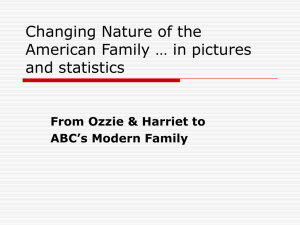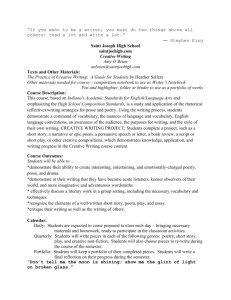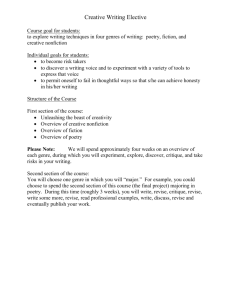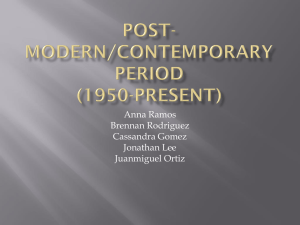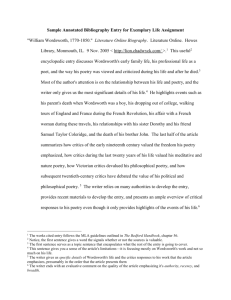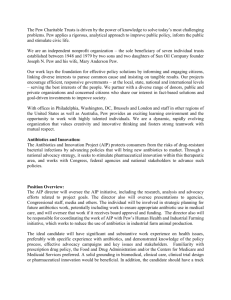view the Place, Environment, Writing course booklet
advertisement
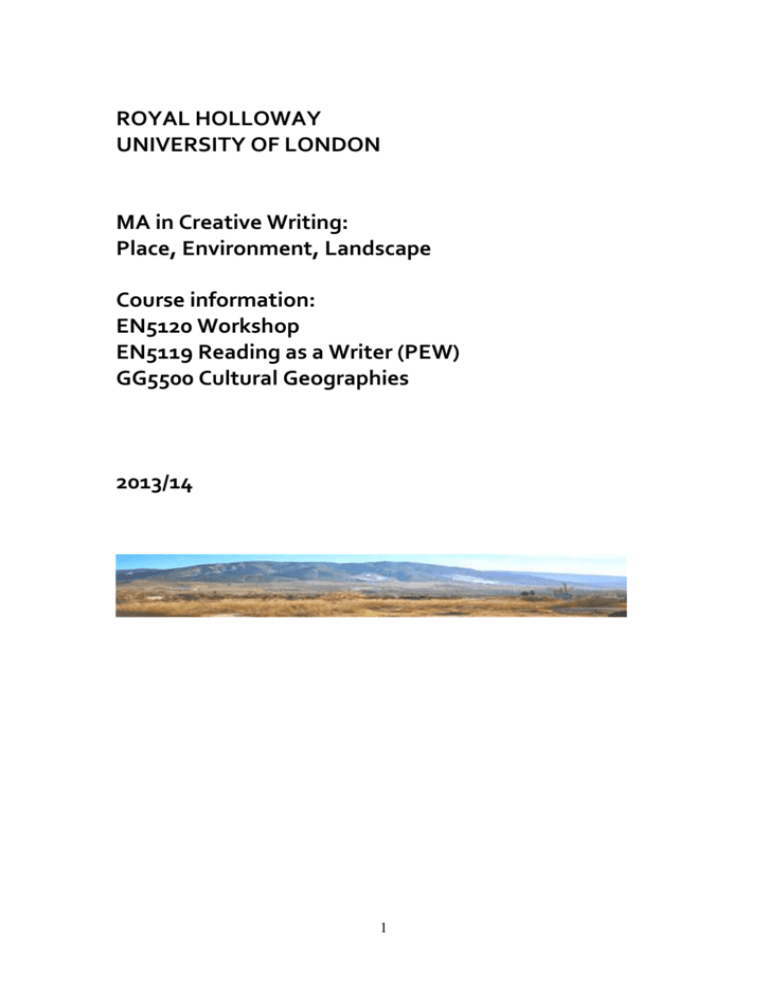
ROYAL HOLLOWAY UNIVERSITY OF LONDON MA in Creative Writing: Place, Environment, Landscape Course information: EN5120 Workshop EN5119 Reading as a Writer (PEW) GG5500 Cultural Geographies 2013/14 1 Welcome to PEW This course booklet should be read in conjunction with the Postgraduate Taught handbook and the MA in Creative Writing Student Handbook. PEW students take the following courses: EN5120 PEW Workshop (2013/14, jointly with Life-Writing) GG5500 Cultural Geographies EN5119 Reading as a Writer (PEW) EN5117 Dissertation on Practice EN5113 Creative Writing Project See the MA in Creative Writing Student Handbook for information on EN5117 Dissertation on Practice and EN5113 Creative Writing Project and assessment deadlines and regulations generally. Course Tutors Harriet Hawkins: Harriet.Hawkins@rhul.ac.uk Professor Andrew Motion: Andrew.Motion@rhul.ac.uk Professor Jo Shapcott: Jo.Shapcott@rhul.ac.uk Kate Williams: Kate.Williams@rhul.ac.uk 2 Timetable Autumn Term Mondays 2.00-5.00 EN5120 Workshop (tutor) Kate Williams Tuesdays 11.00-1.00 GG550 Cultural Geographies, Harriet Hawkins Spring Term Mondays 2.00-5.00 EN5120 Workshop (tutor) Kate Williams time t.b.c. EN5119 PEW Reading as a Writer Andrew Motion/Jo Shapcott Summer Term EN5117 Dissertation on Practice and EN5113 Creative Writing Project supervised by Andrew Motion, Jo Shapcott, Harriet Hawkins. Students will be invited to attend the Summer Programme for the MA if they are interested (see MA in Creative Writing Handbook for further information). 3 EN5120 PEW Workshop: Course Leader: Kate Williams Teaching: One three-hour workshop per week over Spring and Autumn terms, together with EN5501 – The practice of Life Writing Venue: Bedford Square Aim and Objectives: The course aims to develop students' understanding of and ability in writing about the environment - in fiction, non-fiction or poetry. They will develop an advanced understanding of methods of writing about the environment and be aware of the diversity of subject-matter within the field. As well as encouraging individual exploration in writing about the environment the course will help them to combine academic and creative research in the field of writing and the environment. The content of the workshops will be dictated by the presentations of written work of the members of group, produced in consultation with the course tutor, and by the critical dialogue that develops from the presentations. Reading of classic and contemporary writing about the environment will also feed into workshop discussions. Normally, the creative written work of three students is discussed in each seminar. However, seminars will sometimes focus on an individual piece of work and at other times on a range of work by different members of group. By the end of the course unit the student will have produced two portfolios of creative work (one for each term) based on place and environment: for example, two fully-realised pieces of creative nonfiction, or fiction (5000 words), or two short collections of poetry (12 pages each). Presentation: Prose fiction and non-fiction will be double-spaced. Please number the pages and put your name on every page. Poetry should be single spaced and all poems submitted should be in a single document. As with the prose, please number the pages and put your name on every page. 4 EN5119 Reading as a Writer (PEW) Course Leaders: Professor Andrew Motion and Professor Jo Shapcott Teaching: One one-and-a-half hour seminar each week in Term 2. Venue: Bedford Square Aims and objectives: The principle aim of Reading as a Writer (PEW) is to enable students to read as a writer to inform their own literary composition and to develop an advanced understanding of complex and varied traditions, themes and new trends in environmental writing. It should help students to develop a conceptual understanding of modes of environmental writing across historical and contemporary cultures and enable students to use this understanding as a context for their own practice. By the end of this course, students should have: - an appreciation of their own work in the tradition of writing about the environment - developed individual bibliographies for their own practice. - an advanced understanding of the traditions, themes and new trends in environmental writing. - an understanding of cultural contexts for environmental reading and writing practice. - an ability to use critical reading in the student’s own practice in writing about the environment. By the end of the course students will have produced a short essay, 3,000-4,000 words, on a topic related to their studies during EN5119. Teaching: Teaching is in one and a half hour sessions weekly in Central London during the Spring Term. Students will participate in a variety of teaching and learning methods including seminar paper/minilecture/discussion. All students are required to complete a formal presentation once in the term. This will receive verbal feedback from the course tutor and student peers. 5 Content: Weeks 1-10 Students will select and read a selection of fiction, non-fiction and poetry from the perspective of the environmental writer. This will agreed at the first meeting. For example: Week 1 Romantic Ecology: Wordsworth and the Environmental Tradition Wordsworth, The Prelude Dorothy Wordsworth, Alfoxden and Grasmere Journals Bate, Jonathan. Week 2 Transcendental Ecology Henry David Thoreau, Walden Ralph Waldo Emerson, Nature Herman Melville, Moby Dick Week 3 Elizabeth Bishop, Complete Poems Week 4 Rachel Carson, Silent Spring Week 5 Journals, Notebooks and Field Guides Week 6 Ecocriticism Sue Ellen Campbell, The Ecocriticism Reader (1996). Week 7 Contemporary Writers and the City, the Suburbs Paul Farley and Michael Symonds Roberts, Edgelands Eavan Boland, Object Lessons Virginia Woolf, Night and Day Ian Sinclair, London Orbital 6 Week 8 Contemporary Writers and the Natural World 1 John Burnside and Maurice Riordan, Wild Reckoning, Calouste Gulbenkian Foundation Margaret Atwood, Surfacing Tim Dee, The Running Sky: A Birdwatching Life Ted Hughes, Crow, and others Week 9 Contemporary Writers and the Natural World 2 Kathleen Jamie, The Tree House, Picador Kathleen Jamie, Findings Alice Oswald, Dart, Faber and Faber Colin Tudge, The Secret Life of Trees Week 10 Contemporary Writers and Climate Change Jared Diamond, Collapse. London, Penguin. Ian McEwan, Solar Ed. Paul Munden, Feeling the Pressure: Poetry and Science of Climate Change Ed. Neil Astley, Earth Shattering: Ecopoems Course review Bibliography This is a selected bibliography. Students are expected to branch out from this selection to follow their own interests. Poetry Poetry of the ‘Natural’ World Alice Oswold, Dart Faber, Don McKay Strike/Slip McLelland and Stewert Ted Hughes River Mary Oliver American Primitive Back Bay Kathleen Jamie The Tree House Picador Owen Sheers Skirrid Hill Seren Philip Gross Water Table Bloodaxe 7 Urban/Suburban Poetry Tobias Hill, Nocturne in Chrone and Sunset Yellow, Salt Karen Solie, Pigeon Anansi Robert Hampson Seaport Shearsman Carl Sandburg Chicago Poems University of Illinois August Kleinzahler Sleeping it Off in Rapid City FSG Paul Farley Ice Age Eavan Boland (suburban poems…) Journeying and Displacement Elizabeth Bishop Complete Poems Chatto and Windus Creative Non-Fiction Rebecca Solnit A Fieldguide to Getting Lost Canongate, 2006 Kathleen Jamie Findings Sort of Books, 2005 Robert Macfarlane The Wild Places Granta 2007 Ian Sinclair London Orbital Penguin 2003 Lucy Lippard The Lure of the Local New Press 1998 Michael Symmons Roberts and Paul Farley Edgelands Jonathan Cape 2011 Richard Mabey The Unofficial Countryside Little Toller 2010 W G Sebald The Rings of Saturn Vintage 2011 Rachel Carson The Silent Spring Penguin 2010 Sarah de Leeuw Unmarked: Landscapes along Highway 16 NeWest 2004 Sarah de Leeuw Columbus Burning Gary Snyder The Practice of the Wild Counterpoint 2010 John McPhee Coming into the Country FSG 1991 Bruce Chatwin The Songlines Vintage 2008 Barry Lopez Arctic Dreams Vintage 2001 E B White Here is New York Little Bookroom 1999 Jim Perrin West: A Journey Through the Landscapes of Loss Atlantic 2010 Roger Deakin Waterlog: A Swimmer’s Journey Through Trees Vintage 2009 8 Other Peter Ackroyd, Thames, Sacred River (2008) William Howard Adams, Stuart Wrede (Eds), Denatured Visions, Landscape and Culture in the 20th Century (1991) Gaston Bachelard, The Poetics of Space (1969) Jonathan Bate, The Song of the Earth (2000) Italo Calvino, Invisible Cities (1974) Kenneth Clark, Landscape in Art (1949) David E. Cooper, Convergence with Nature (2012) Merlin Coverley, Psychogeography (2011) Roger Deakin, Wildwood, A Journey through Trees (2007) Roger Deakin, Notes from Walnut Tree Farm (2008) Greg Garrard, Ecocriticism (2004) Peter Hall, Cities in Civilisation (1998) Robert Pogue Harrison, Gardens, an essay on the human condition (2008) Robert Pogue Harrison, Forests, the shadow of civilisation (2010) Richard Mabey (Ed), The Oxford Book of Nature Writing (1997) Richard Mabey, A Brush with Nature (2010) Robert MacFarlane, The Wild Places (2007) Lewis Mumford, The City in History (1968) Geoff Nicholson, The Lost Art of Walking (2011) Oliver Rackham, The History of the Countryside (1987) Simon Schama, Landscape and Memory (2004) Iain Sinclair, Lights out for the Territory (1998) Rebecca Solnit, Migrations (2011) Edward Thomas, The Heart of England (1906) Colin Ward, Talking Green (2012) Raymond Williams, The Country and the City (1973) Jennifer Westwood, Jacqueline Simpson, The Lore of the Land (2005) Gilbert White, The Natural History of Selborne (1789/1977) 9 GG5500 Cultural Geographies Course Leader: Harriet Hawkins (Oct-Dec) Tuesdays, 11-1 pm, F3, 11 Bedford Square, Bloomsbury, London This element consists of a series of modules on ideas in contemporary Cultural Geography. The core modules comprise two-hour discussion seminars, most running weekly through the first term. In consultation with staff, students produce one course paper (up to 4,000 words) addressing selected ideas and approaches in contemporary Cultural Geography. For details on this assessment and on the module aims and learning outcomes please see the course specification online at http://www.rhul.ac.uk/coursecatalogue/home.aspx Students might also want to attend the Landscape Surgery sessions, once a fortnight, Tuesdays, 2-4, F3, 11 Bedford Square. Please go to www.landscapesurgery.wordpress.com Assessment: For this course you will write one essay (4000 words) Deadlines tbc. Topics: The choice of topic is up to you, and in consultation with the course director you should approach staff members with the appropriate research specialisms to help shape your titles and devise your work. Draft Process: As part of this process we offer you the chance to write drafts of your essays (to be emailed to advisor by 10th December full time students; 6th May parttime students) these will be read within three weeks and commented upon by staff members. They will be in contact with you to arrange a meeting in order to discuss your work. Please only submit full essays (with references) to be read, bullet pointed texts are not appropriate. NB: The first essay must be re-submitted at the same time as the second essay (Reading as a Writer PEW) for summative assessment. This is the first day of the summer term (or September, for part-time students, exact date tbc)). The essay is worth 12.5% of your total grade for the MA. 10 Format: Students are required to produce a 4,000 word essay on a topic of their choice derived from the content of the course. Schedule and Key Readings: Each week you will be assigned a series of readings, a number of these will be starred it is expected that you will come to the seminars able to discuss these readings. Some staff might assign individuals to particular readings to encourage deeper levels of engagement. In addition other readings will be provided, it is a good idea to engage with as many of these as you can. Seminars are co-operative occasions which depend on the willingness of students to share and debate issues considered in advance or raised in the course of discussions by the tutor or fellow-students. They provide students with the opportunity to focus intensively upon particular aspects of environmental/geographical thought and to discuss specific texts with close attention and to engage with more general practical or critical issues. This course will use Moodle The course readings and seminar summaries will be put online at least a week ahead of the relevant seminar Course Outline: 1st Oct Introduction to Cultural Geography (Harriet Hawkins) 8th Oct Place (HH) 15th Oct Space (Phil Crang) 22nd Oct Mobilities (PC) 29th Oct Regions (Harriet Hawkins) 5th Nov The Urban (OM) 12th Nov Nature (Veronica della Dora) 19th Nov Landscape (VdD) 26th Nov Cultural Geography Futures: Open Space Day Event 3rd Dec Mapping (Felix Driver) 10th Dec Exploration (FD) v 11
